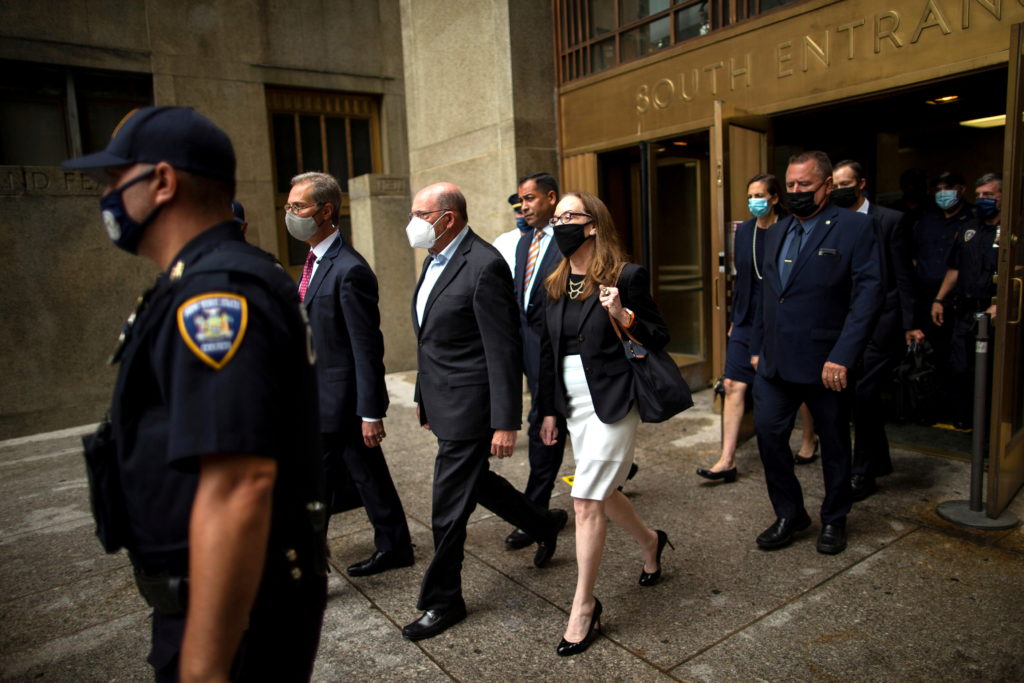The Trump Organization and its chief financial officer are reeling from a series of tax crime charges that allege they paid senior executives off the books to avoid paying taxes.
The indictment alleges a “scheme to defraud” tax authorities at the federal, state and city level in New York through tax evasion that occured since at least 2005.
Trump Organization Chief Financial Officer Allen Weisselberg was named as one of the largest beneficiaries of the scheme, allegedly receiving more than $1.76 million in off-the-books compensation, including apartment rent, car payments and school tuition.
WATCH: The ‘substantial blow’ to the Trump Organization and what it could mean for Trump
The Trump Organization responded in a statement Thursday saying Weisselberg was being used as “a pawn in a scorched-earth attempt to harm the former president.”
The Trump Organization is the umbrella business enterprise for former President Trump’s investments in office towers, hotels, golf courses and many of his marketing and television deals. Donald Jr. and Eric, Trump’s eldest sons, were put in charge of the company’s day-to-day operations after Trump became president.
Columbia Law School Professor John C. Coffee, Jr. helped answer some questions about this latest development:
Who is targeted in the charges?
The charges filed on Thursday are against the Trump Organization and its CFO, John Weisselberg.
Neither former President Donald Trump, nor anyone in his family, has been charged in the indictment, but Coffee said evidence found during a trial may affect everyone in the organization. It is also possible that other charges could be brought forward.
What are the charges?
The formal charges against both the organization and Weisselberg include:
- Scheme to defraud in the first degree
- Conspiracy in the fourth degree
- Grand larceny in the second degree
- Criminal tax fraud in the third and fourth degrees
- Offering a false instrument for filing in the first degree
- Falsifying business records in the first degree
What does this mean for Weisselberg?
Weisselberg potentially faces a long prison sentence which, at its maximum, Coffee said, could lead to a life imprisonment for the 73-year-old businessman.
The maximum sentence for Grand Larceny in the Second Degree alone is 25 years. Coffee said it’s unlikely that a judge will apply that sentence to Weisselberg, who is a first time offender.
The Trump Organization responded to the charges Thursday, saying Weisselberg was being used as “a pawn in a scorched-earth attempt to harm the former president.”
Manhattan juries, Coffee said, have a “very high tendency” to convict in white collar cases.
What the indictment against the Trump Organization means
Coffee said while the prosecutors can’t send a business to prison, they could “significantly deplete the value of the Trump Organization.”
The organization could face financial penalties if the charges are upheld.
The cost for the charge of conspiracy, for instance, is double the loss or gain that was caused. Currently, the indictment states Weisselberg took approximately $94,902 in tax refunds he was not entitled to during the course of the alleged conspiracy.
Coffee said stigmatization may also be a secondary consequence of the investigation. Investment banks may stop working with Trump or his organization and condo boards around New York City may also disassociate from dealing with the business.
What does this mean for Donald Trump?
While Donald Trump is not directly charged in this indictment, Coffee pointed out that he and his family privately run the organization and any discovered instances of fraud or manipulation, especially from an eyewitness testimony from someone like Weisselberg, could be tied to them.
Coffee pointed out that the indictment is largely focused on “perks” that members of the organization potentially acquired illegally, which he said are not usually criminally prosecuted. But, he said that may not be the main purpose of the indictment.
Information taken from Weisselberg during this process could have broader implications in New York’s ongoing investigation into Trump and his dealings.
Coffee said Weisselberg has a binary choice when facing the prosecutors: “Either cooperate, or don’t cooperate.”
It’s unclear if Trump will face charges connected to this investigation, but Coffee believes we could have an answer about that by the end of the year. District Attorney of New York County, Cyrus Vance Jr., who is spearheading the case, ends his tenure in January.













































